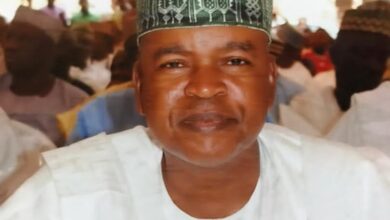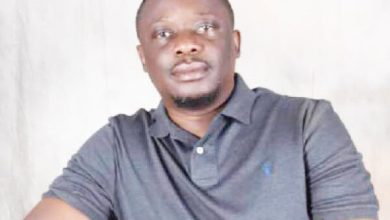Why I am passionate about bridging communication gap – Moji Danisa
In this interview, veteran broadcaster, Moji Danisa, commonly known as ‘Queen of Tabloid Journalism’ for her riveting insights into the lives of socialites and celebrities back in the days, speaks on her mission to bridge the gap between the common man and policies of government with “Break It Down” a weekly television program that x-rays contemporary issues. Excerpts:
Tell us about ‘Break It Down?’
“Break It Down’ is a 30-minute show on television which is focused on development policies, and projects. It falls under governance actually, we are looking at non-governmental organizations and because we are already on air, we look out for people in government, ministry departments and agencies, Sustainable Development Goals, SDGS, amongst others. So we want to bring policies and other issues closer to the people, simplifying the issues, that is what we say, that is our pay off.
Actually it is communications development, that is our catchment area, so that is basically what it is; we break it down in the language that the common man would understand. We discovered that there is a dearth in communication between the government and the governed because government uses technocrats and experts mainly, who are very used to these high sounding languages, jargons, and the common man does not understand what they are saying, what you hear the common man say most times is that “they are doing their thing there.”
If you ask a common man now what is restructuring, he will just be looking at you and might say they want to divide Nigeria, he does not really understand what restructuring is or how it can even benefit him or even the negatives and this is where ‘Break It Down’ comes in to make these technicalities better appreciated by the man on the street.
Besides what you just said, what else inspired or moved you into this?
The programme was conceived in other to ensure that information on policies of government for a better informed audience and society is easily understood by all, because even some of us we do not understand, like sometimes I find myself going to Google to find out some things they speak about, when technocrats come on television to make proposals or speak on policies of government. I want to have an in-depth knowledge of want they are talking about, for instance the Petroleum Industry Bill, PIB, how does it benefit me? Beyond me how does it benefit the tomato seller in the market, because they are the government, they are the people that vote during elections, they make up the larger percentage of the society, and that should be the yardstick for assessing the average person. So there is this disconnect between the government and the people, that was what actually gave birth to this idea.
You are highly resourceful. So what should we your audience expect to make it better?
For now, we talking to the experts mainly because we are still building the structure, but very soon starting from this quarter we are going to bring the people in, because originally it was designed for the people to call in and ask questions that they do not understand for the guests or resource persons to respond by breaking it down to their understanding, we are going to get there, to actually make the people part of the programme not just the resource persons.
How do you hope to bridge this gap because there are some technocrats who do not understand the language of the grassroots?
You can hardly find a technocrat who did not grow on the streets especially if the person is a Nigerian. They should understand the basic language of every human being, especially those within their environment and if you are a technocrat you should also be a communicator who must learn to deal with a specific audience and that audience is the common man. I bet you, the technocrat even if he is from Harvard because of my expertise as a communicator, interviewing people, I would make that person speak the language the common man understands, and of course there would be guidance.
What is your project five years from now?
We would have achieved our specific aim which is to make the people understand better every single policy of government and other critical stakeholders would be brought to the people, so that the people can understand better and that would make people know if the government is doing well or if they are doing poorly.
Unlike when experts say they have passed the PIB, most people do not understand but some pretend they understand. We would have achieved bridging that information gap, then of course, we are going to do seminars workshops, those are in the pipeline.
We are also going to focus on education, building leaders for the future, that is one of our major projects we would do in 2021, there is going to be a huge conference where we are going to discover leaders for the future, as we can see there is a dearth in leadership, as we have seen the old people do not want to leave the scene because they think the youths are not ready. So how ready are we to have a successor generation. You saw what happened during the #EndSARS protest, we know the mistakes that the youths made, we know the efforts, we also know the gains they achieved, so let us build solid successors to take over from this generation.
Given the potential of our young people, why do you think they are not coming to the fore in government?
The fact is that there is a vacuum, and that vacuum was left by the generation after the old people, which is my generation, we were the oppressed generation, we were the generation that witnessed military brutality, we are the generation that was silenced for a very long time, we were the generation that was impoverished and made to beg for bread, so we have lost our voice, and so because we had lost our voice, we could not impact on the generation after us, that is exactly where the disconnection came from and this new generation they are just finding their feet. I am so impressed with them; I think it is because most of them have solid education from what I have seen. Forget the fact that we say the Nigerian education is poor, these children are the digital generation there are a lot they learn outside the school curriculum, but they have learnt a lot about leadership and I think that they are ready to take the baton of leadership. For my generation, forget it, we have lost it.
Message to the average Nigerian, especially the youth on what you are doing?
We are engaged in leadership and development, they should just keep learning first, it is very important, the need for self-development, they should develop themselves, their capacity, get involved in leadership trainings, workshops and then try to lead from their different levels, even if it is classroom, almost everybody has an innate leadership potential they should take it one step at a time. They are a very bold generation, for instance if I put my daughter before the president, she is going to tell him her mind without shaking. This is the Generation. It is the generation that would build Nigeria, and I just want them to know that we believe so much in them and they should keep it up.
Source: The Abuja Inquirer





